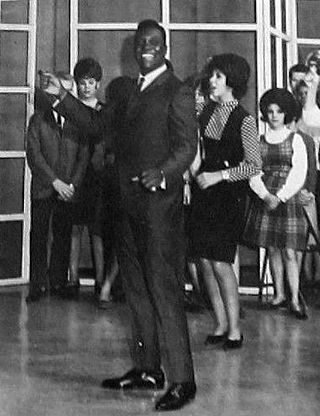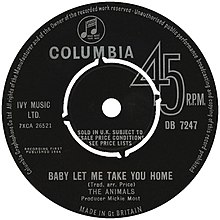
The Animals are an English rock band, formed in Newcastle upon Tyne in the early 1960s. The Animals are known for their deep-voiced frontman Eric Burdon and for their gritty, bluesy sound, exemplified by their signature song and transatlantic number-one hit single "The House of the Rising Sun" as well as by hits such as "We Gotta Get Out of This Place", "It's My Life", "Don't Bring Me Down", "I'm Crying", "See See Rider" and "Don't Let Me Be Misunderstood". They balanced tough, rock-edged pop singles against rhythm-and-blues-oriented album material and were part of the British Invasion of the US.

Mathis James Reed was an American blues musician and songwriter. His particular style of electric blues was popular with a wide variety of audiences. Reed's songs such as "Honest I Do" (1957), "Baby What You Want Me to Do" (1960), "Big Boss Man" (1961), and "Bright Lights, Big City" (1961) appeared on both Billboard magazine's R&B and Hot 100 singles charts.
Bertrand Russell Berns, also known as Bert Russell and (occasionally) Russell Byrd, was an American songwriter and record producer of the 1960s. His songwriting credits include "Twist and Shout", "Piece of My Heart", "Here Comes the Night", "Hang on Sloopy", "Cry to Me" and "Everybody Needs Somebody to Love", and his productions include "Baby, Please Don't Go", "Brown Eyed Girl" and "Under the Boardwalk".

The Hollies are an English rock and pop band formed in 1962. One of the leading British groups of the 1960s and into the mid-1970s, they are known for their distinctive three-part vocal harmony style. Allan Clarke and Graham Nash founded the band as a Merseybeat-type group in Manchester, although some of the band members came from towns further north, in east Lancashire. Nash left the group in 1968 to form Crosby, Stills & Nash, though he has reunited with the Hollies on occasion.

Alan Price is an English musician who first found prominence as the original keyboardist of the English rock band the Animals. He left the band in 1965 to form the Alan Price Set; his hit singles with and without the group include "Simon Smith and the Amazing Dancing Bear", "The House That Jack Built", "Rosetta" and "Jarrow Song". Price is also known for work in film and television, taking occasional acting roles and composing the soundtrack of Lindsay Anderson's film O Lucky Man! (1973). He was inducted into the Rock and Roll Hall of Fame in 1994 as a member of the Animals.

Freddie Scott was an American soul singer and songwriter. His biggest hits were "Hey, Girl", a top ten US pop hit in 1963, and "Are You Lonely for Me", a No. 1 hit on the R&B chart in early 1967.

"Come See About Me" is a 1964 song recorded by the Supremes for the Motown label. The track opens with a fade-in, marking one of the first times the technique had been used on a studio recording.

The Tremeloes are an English beat group founded in 1958 in Dagenham, England. They initially found success in the British Invasion era with lead singer Brian Poole, scoring a UK chart-topper in 1963 with "Do You Love Me".

"All I Really Want to Do" is a song written by Bob Dylan and featured on his Tom Wilson-produced 1964 album, Another Side of Bob Dylan. It is arguably one of the most popular songs that Dylan wrote in the period immediately after he abandoned topical songwriting. Within a year of its release on Another Side of Bob Dylan, it had also become one of Dylan's most familiar songs to pop and rock audiences, due to hit cover versions by Cher and the Byrds.

"Here Comes the Night" is a 1964 song, written by Bert Berns. It became a hit for Northern Irish band Them, fronted by Van Morrison, in March 1965, charting at No. 2 in the UK and No. 24 in the US. Them's single is listed at either No. 33 or No. 36 in the Top 100 best-selling UK singles during the calendar year 1965, depending on source.
"Baby, Let Me Follow You Down" is a traditional folk song popularised in the late 1950s by blues guitarist Eric Von Schmidt. The song is best known for its appearance on Bob Dylan's debut album Bob Dylan.

Meet the Supremes is the debut studio album by The Supremes, released in late 1962 on Motown.

"Don't Let Me Be Misunderstood" is a song written by Bennie Benjamin, Horace Ott and Sol Marcus for American singer-songwriter and pianist Nina Simone, who recorded the first version in 1964. "Don't Let Me Be Misunderstood" has been covered by many artists. Two of the covers were transatlantic hits, the first in 1965 by the Animals, which was a blues rock version; and in 1977 by the disco group Santa Esmeralda, which was a four-on-the-floor rearrangement. A 1986 cover by new wave musician Elvis Costello found success in Britain and Ireland.

"Don't Bring Me Down" is a song composed by Gerry Goffin and Carole King and recorded as a 1966 hit single by the Animals. It was the group's first release with drummer Barry Jenkins, who replaced founding member John Steel as he had left the band in February of that year.

The Most of the Animals is the title of a number of different compilation albums by the British blues rock group the Animals. Although track listing varies, all feature only songs from 1964 and 1965. The title is derived from the name of their then producer Mickie Most.
"The House of the Rising Sun" is a traditional folk song, sometimes called "Rising Sun Blues". It tells of a person's life gone wrong in the city of New Orleans. Many versions also urge a sibling or parents and children to avoid the same fate. The most successful commercial version, recorded in 1964 by the British rock band The Animals, was a number one hit on the UK Singles Chart and in the US and Canada. As a traditional folk song recorded by an electric rock band, it has been described as the "first folk rock hit".

"Take Out Some Insurance" is a blues song released in 1959 by Jimmy Reed written by Charles Singleton and Waldenese Hall but originally credited to Jesse Stone. The copyright registration for the song lists its title as "Take Out Some Insurance on Me, Baby".. Tony Sheridan recorded it with different lyrics in 1961 with The Beatles as his backing band. Misidentified, it was released in Germany in 1964 as "If You Love Me, Baby " but subsequently as "Take Out Some Insurance on Me, Baby ", "Take Out Some Insurance on Me, Baby" or erroneously as "If You Love Me, Baby".
"Nobody's Child" is a song written by Cy Coben and Mel Foree and first recorded by Hank Snow in 1949. Many other versions of this song exist.

Gil Hamilton, known as Johnny Thunder, is an American R&B and pop singer whose biggest hit was "Loop de Loop" in 1963.
The following list is the discography of the American soul musician Solomon Burke.















